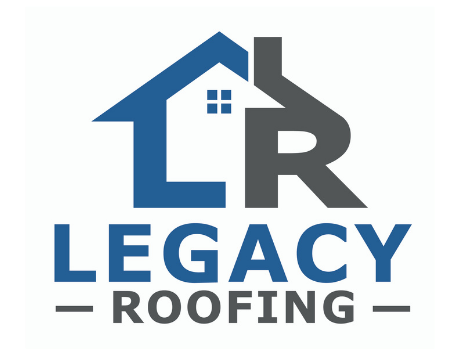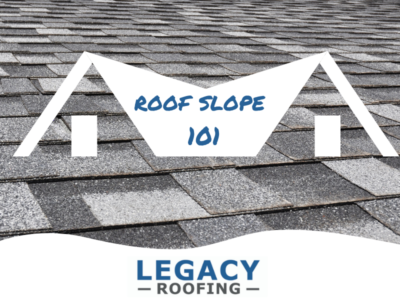What is roof slope and why does it matter?
Let’s be honest—if you’re the average homeowner, your roof isn’t something you think about often. Maintenance? Sure. But your roof slope probably doesn’t cross your mind until there’s a problem. So, what is roof slope exactly?
The angle helps your roof shed water, handle snow, and improve accessibility for inspections or repairs. Even though your roof slope usually stays out of sight, it plays a huge role in protecting your home.
What is a roof slope (roof pitch)?
The slope of a roof, also known as roof pitch, is the measurement of how steep or shallow your roof is. It’s calculated by the roof’s vertical rise over a horizontal distance, often described as “rise over run.” For example, a roof slope with four inches of rise for every twelve inches of distance would be called a 4/12 slope.
Different roof pitches bring different benefits and challenges. A steeper slope helps water drain quickly, while a low slope or flat roof may require special roof design and moisture control. Some homeowners even consider changing from a flat roof to a pitched roof for better drainage and to reduce long-term roofing concerns.
Your roof design does more than shape your home’s look. It plays a big part in how well your roof handles water, snow, and wind. A well-planned roof pitch improves performance and prevents moisture build-up or pooling, which can cause costly damage over time.
It’s also important to note that the complexity of a roof slope affects not only its function but also material choices and installation. Steeper designs or mixed roof pitches often require experienced roofers who understand the challenges of different roof slope configurations. The pitch also determines which materials—like shingles, metal, or membrane roofing—will work best for your home.
And while roof slope and roof pitch are often used interchangeably, there’s a slight difference. Roof slope refers to rise over run, while roof pitch uses rise over span—the total distance from one wall’s top plate to the opposite wall.
What is the standard slope of a roof?
Most homes follow a standard roof design with a slope between 4/12 and 9/12. This balance helps prevent water damage while keeping insurance costs reasonable. Low-slope roofs, often seen on modern or commercial buildings, usually range from a 2/12 to 4/12 slope.
Steeper slope roofing—up to 20/12—offers better water runoff but may cost more to install. Whether you have low-slope roofs or steeper designs, understanding your slope roofing helps protect your roof and avoid costly repairs.
Common Roof Slopes’ Roofing Materials – Flat Roof vs. Sloping Roofs
Different roof slopes call for different roofing materials. Picking the right one can save money and prevent headaches—especially when it comes to water resistance and long-term durability.
Roofing Materials for Flat Roofs

Flat roofs are popular for their simple look and lower cost, but they need extra care to prevent water pooling. The math here is simple—less slope means slower drainage. (Yes, a little mathematics comes into play!) Because of this, flat roofs often use materials designed to keep water out and handle Idaho’s shifting weather.
Here are some common choices:
- PVC membrane roofing – Lightweight and flexible, great for commercial and residential flat roofs.
- TPO membrane roofing – Known for its energy efficiency and durability.
- EPDM membrane roofing – A rubber-based option that resists UV rays and water buildup.
- Standing seam metal roofing – Metal roofing and metal panels are strong choices. They handle pooling water well and add a modern look.
Roofing Materials for Sloping Roofs
Regarding roofing materials for sloping designs, homeowners have many more options to match their roof style and budget. You’ll find everything from classic choices to high-tech upgrades. That said, more choices often mean more roofing challenges, and getting it installed right usually requires expert hands and smart planning.
Here are some popular materials for slope roofing:
- Asphalt shingles – A go-to for many homes. A well-installed roof shingle system sheds water fast and holds up well in different climate conditions. Best suited for roof slopes of 2/12 and higher.
- Wood shingles – Offer a natural, timeless look, but they demand good waterproofing and regular care, especially in wet climates.
- Slate shingles—Durable and striking, slate offers strength and beauty, but it’s heavier and often needs extra structural support.
- Solar panels – Great for sloped roofs with good sun exposure. Adds energy efficiency without compromising roofing performance.
- Metal roofing—Known for its toughness, metal roofing can withstand heavy snow, rain, and extreme heat without blinking.
The right material depends on more than just looks. Your roof must be designed to shed water properly and fit your climate. Good roofing design also protects the attic by preventing heat buildup and moisture problems.
Quick tip: Steeper-slope roofs often need extra fabric layers underneath for better waterproofing before the main roof covering goes on. This simple step keeps leaks out and peace of mind in.
If you’re unsure which roof shingle or material best suits your project, just ask! A quick chat with the right team can save you a lot of guessing (and fixing) later.
Asphalt shingles

One of the most common roofing materials is, undoubtedly, asphalt shingles. Their design to shed water makes them a formidable force for any slope roofing system; therefore, they should only be used for roof slopes 2/12 and greater. Regarding low-slope roofs, getting a professional consultation for asphalt shingles is highly recommended.
Understanding Low-Slope Roofs: A Comprehensive Guide
Low-slope roofs are essential and serve a unique purpose, primarily for commercial buildings. They comprise a low-pitched roof with a low slope equal to or under the 2/12 metric. This roofing system is often made out of modified bitumen or versions of metal and concrete roofing. Areas with heavy snowfall often have minimum roof pitch details within building codes to adhere to state and local ordinances.
Flat Roofs
Flat roofs are a part of a building’s architecture, traditionally used by commercial properties to accommodate larger populations of people. While they do not have extra attic space like steeper roof slopes, roofing manufacturers have made flat designs that allow for more foot traffic, storage, and green roofing systems.
Keep in mind that most low-slope roofs aren’t truly flat per se due to a slight degree of slope, which prevents the build-up of rain and snow. As mentioned above, suitable roofing materials are therefore required to ensure stability and durability.
Steep Slope Roof
A steep-slope roof, however, has a much steeper slope ratio than its low-slope counterparts for obvious reasons. More often than not, you will find these varieties in residential buildings, and they usually come with more attic space for proper ventilation. Steep roofs allow the option to choose from a multitude of regular roofing shingles, like asphalt shingles, which are the most common in the marketplace among other designs, rather than only a few like the former.
FAQ Roof Slope:
1. Is a higher roof pitch better?
The higher the slope and pitch of your roof, the more structurally sound and resistant your roof will be to the elements and the formation of weak spots on your roof. The cost will be higher due to more surface area to cover for roofing materials; however, you certainly get what you pay for, provided you are on top of proper maintenance!
2. Does roof slope matter when I get a new roof?
The short answer is no, your slope doesn’t matter when you are replacing your roof shingle(s). If you are getting a new roof and are determining the proper slope, the only factor is the pitch. The higher the slope and pitch of your roof, the more skilled labor is required and sometimes that can cost a bit more!
3. How much does slope roofing cost?
Chances are, you will never change the slope of your roof! However, the cost of changing a roof slope depends on a few key factors: your roof’s size, the design’s complexity, and labor rates in your area. On average, a new roof slope project can run between $15,000 and $20,000.
That price can rise if the job requires major construction work or changes to the attic structure. The type of materials you choose also affects the roofing cost. For example, installing premium asphalt shingle systems or switching to metal panels will add to the total.
Remember to factor in the cost of replacing your old roof if the project requires tearing it off. The bottom line? Every project is unique, so costs can vary quite a bit.
Because of the complexity, it is always smart to call a licensed roofing pro. An experienced roofing contractor can review your design, check for possible issues, and provide a solid estimate before any work begins.
Roof slope, as mentioned above, is calculated by vertical rise over horizontal run. Here are the metrics to take into account:
- Less than or equal to 2/12 – Low slope roofs with a low pitch.
- 2/12 < x < 6/12 – Medium slope roofs with a medium pitch (standard roof pitches)
- Greater than or equal to 6/12 – Steep slope roofs with a steep pitch.
4. Why is roof pitch important?

Your roof’s pitch determines the structural components of your roof deck and roofing material (roofing shingles, wood shakes, etc.) you will use on your house. While it plays an integral part in the style and aesthetic value of your roof, it also contributes to overall durability and your roof’s ability to shed rain and snow runoff.
Roof Slope Verdict –
Your roof slope might not get much attention, but it’s critical to your home’s safety and performance. Even if it reminds you of old geometry lessons, understanding the basics can help you make smarter choices.
Knowing your roof slope can save you money and headaches in the long run, from preventing water buildup to selecting the right asphalt shingle or roofing material.
Feel free to reach out if you have any questions or want to explore your roof options in Boise, Idaho. We’re always ready to chat and help with anything roofing!


